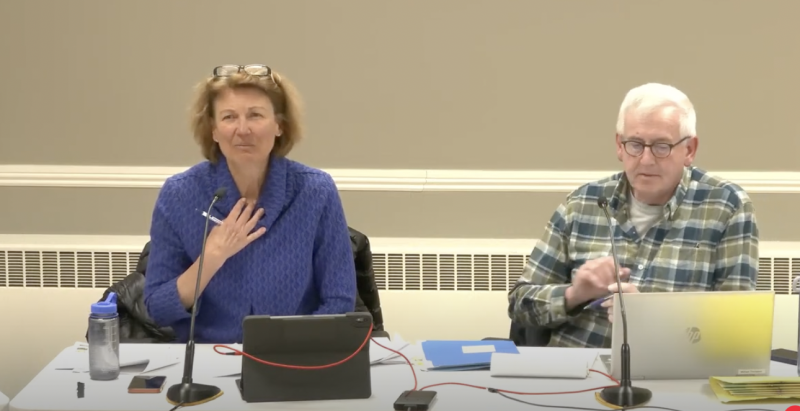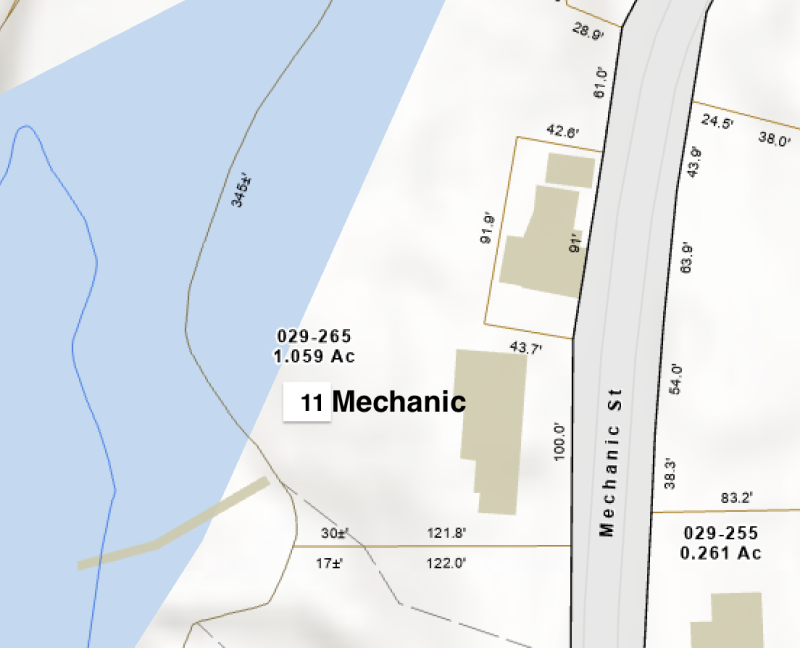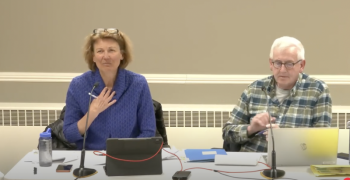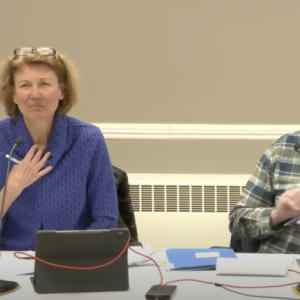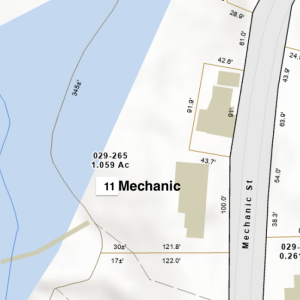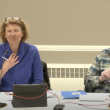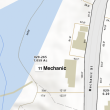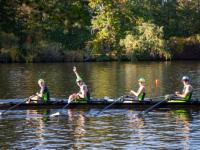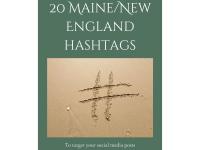Rockport poisoned trees case to go before state; Select Board discusses municipal position
ROCKPORT — For almost four years, the case of herbicide-injected trees on land adjacent to Rockport Harbor has been simmering as investigations were underway. It is coming to a head, however, March 14, at the regular monthly meeting of the Maine Board of Pesticides Control (BPC) in Augusta when a consent agreement between the state and a Rockport homeowner will be reviewed.
The proposed agreement between Maine and Stephen Antonson, of Rockport, concerns alleged unauthorized applications of pesticides Imazapic and Triclopyr, the BPC said.
At issue is a stand of trees behind a home on Rockport Harbor at 11 Mechanic Street, which is currently on the market after its owner, Ruth Graham, died in 2023. It is owned by the Wallace Graham Trust.
Graham's property is adjacent to 9 Mechanic Street, owned by Antonson and Marky Kathleen Hackett, according to the property card on file with the town office.
The Graham property wraps around the back of Antonson's land, extending down to the harbor.
Both properties overlook Rockport Harbor.
A BPC case summary that was prepared in advance of Friday's meeting provides background:
"On October 13, 2022, the BPC was contacted by a Maine Forest Service Entomologist regarding observations of declining tree health and evidence of large drill holes and possible herbicide application to trees at the Graham property located at 11 Mechanic Street in Rockport, Maine. This evidence included leaf curling, bore holes, and impact limited to a distinct corridor of trees directly in line with the deck of the Antonson residence."
The BPC said the Maine Dept. of Forestry had inspected 11 Mechanic Street on Oct. 29, 2021 and collected samples in tree bore holes and the samples were positive for Imazapic and Triclopyr.
Imazapic is, according to the National Library of Medicine, is an herbicide; it is classified as an environmental hazard and toxic to aquatic life.
Triclopyr is an agrochemical used as a herbicide, and is classified as a health and environmental hazard.
In October 2023, the BCP noted signs of soil contamination at the base of trees. Soil samples, "were collected for combined analysis and tested positive for Triclopyr at 360ppm."
"While Antonson denies any involvement in the herbicide applications to the trees at 11 Mechanic Street in Rockport, the Board finds that the positioning of the affected trees in addition to prior correspondence from the Antonson’s to the Graham’s requesting tree removal indicate that Antonson would have been the only one to benefit from the application of herbicides to the affected area," the BPC wrote, in its case summary.
State law prohibits application of pesticides to the property of another, "unless prior authorization for the pesticide application has been obtained from the owner, manager, or legal occupant of that property," the BPC wrote.
"Rationale for Settlement: Antonson did not have authorization to apply pesticides at 11 Mechanic Street in Rockport. Imazapic and Triclopyr active ingredients detected in the samples from 2021 and Triclopyr detected in the samples from 2023 indicate that at least two applications of pesticides were made to trees at the 11 Mechanic Street location without authorization."
Antonson declined to comment on March 11 about the case. His attorney, Daniel Nuzzi, who is with the Portland and Lewiston law firm Brann and Isaacson, said March 11, "We have no comment at this time."
Graham's son, Stephen Graham, is handling his mother's estate and weighed in on the BPC's consideration of the consent agreement. He urged the state to reconsider the proposed financial settlement.
"We hope that the State of Maine agencies and the Town of Rockport agencies do not take this incident lightly," wrote Graham, in a letter submitted to the BCP on March 10. "We just learned of the proposed settlement with the State of Maine, and we simply ask the question of whether the remedy is fitting. Is $3,000 without any admission of guilt a disincentive to anyone where the value of a view can be in the hundreds of thousands of dollars or even more? Does it bear appropriate proportionality to the recent Camden tree poisoning matter? Does the settlement do anything to alleviate the negative reputation that some might associate with the properties immediately proximate to the poisoning?"
Consent agreement
The consent agreement filed by the BPC alleges:
"That, prior to 2021, Antonson approached Ruth Graham on multiple occasions about purchasing harbor frontage or removing trees that impede the harbor view from 9 Mechanic Street.
"That Graham stated she would not sell harbor frontage or remove trees from her property in response to the inquiries described in paragraph three.
"That on October 12, 2021, Ruth Graham contacted the Maine Forest Service requesting a second opinion relative to multiple trees on her property that were declining unexpectedly. Graham had previously contacted an arborist company that was unable to determine the cause of decline."
The consent agreement describes the action of the Maine Forest Service, which sent an entomologist to examine the trees. The entomologist found a series of, "perfectly round one-inch holes bored into the root collar of the affected trees; that the affected trees were directly within a narrow corridor that would allow a view of the harbor from the deck attached to the Antonson residence; and that the combination of observations relating to the declining trees was indicative of herbicide use."
The entomologist transferred jurisdiction to the Maine Board of Pesticide Control and representatives of that agency inspected the property twice in October 2021. They sent the collected samples to the University of Montana Analytical Laboratory for analysis. That lab concluded the presence of pesticides.
On Oct. 17, 2023, "Douglas Cole, Chair of the Rockport Parks and Beautification Committee, contacted the Board to report that additional tree decline on the Graham property had been observed from Rockport Harbor.
"In response to the concern expressed by Cole, a Board inspector returned to the Graham’s property on October 23, 2023, to assess and document site conditions," the consent agreement said.
The inspector document additional tree mortality not evident in 2021.
In the agreement, the BPC alleges that the motive for applying herbicide to the trees was to improve the ocean view.
The consent agreement also states that Antonson did not admit to the allegations and disputes the facts and conclusions outlined the BPC.
He agreed, however, according to the BPC, to enter into the consent agreement to resolve the alleged violations, and waived an opportunity for a hearing.
He agreed to pay a $3,000 penalty.
Select Board responds
At the March 10 Rockport Select Board meeting, Board Chair Denise Munger relayed information about the case to her fellow board members:
"We had a situation in Rockport, about four years now, in which one of the neighbors poisoned the trees of their neighbor so they could get a better harbor view," said Munger.
She said: "They are not admitting they did anything but the findings by the Board of Pesticide Control demonstrates that they could have been the only ones who did this."
Munger said: "It has taken a long time but it is now going to be addressed at the state level and I know the town is looking into whether we have any authority to do anything, primarily replacing those trees. I don’t know how you get all the poison out of the soil and how much ended up in the harbor. It is an unfortunately terrible situation, but some level of justice is being done here."
She said the town is not able to take action against the resident that allegedly poisoned the trees because Graham owns the property on which the trees had existed.
"If you were the landowner and you took those trees down — because they were in 75 feet of the harbor — the town would have authority. I don't know what you do when it is is a neighboring owner who actually trespasses and does that. Certainly the landowner would have had a lawsuit against her neighbor, but she was 94 and she said 'I still have things to do in life and I don't want to be embroiled in a lawsuit.'"
Munger said: "It is important to know. We are a community, and we care about our neighbors, and we want people in our community who take care of each other, not hurt each other."
Rockport Town Manager Jon Duke said that the difference between the Camden case and the Rockport case concerns admission of guilt.
"In the case of the Camden matter, the person who was responsible admitted guilt," said Duke. "Though I think there is a great deal of suspicion amongst neighbors, that guilt has not been determined here, nor has there been any admission that someone has done it. As a result, without an admission of guilt or evidence, then you are forced to look at it as a land use violation.... Without evidence that someone else did it, the one person you can hold responsible is the landowner, which obviously does not make any sense in the world."
Munger countered: "Well, they [the BPC] actually did. They made some very critical findings. There was quite a paper trail. There were letters and a lot of attempts made to get these trees taken down."
Reach Editorial Director Lynda Clancy at lyndaclancy@penbaypilot.com; 207-706-6657

